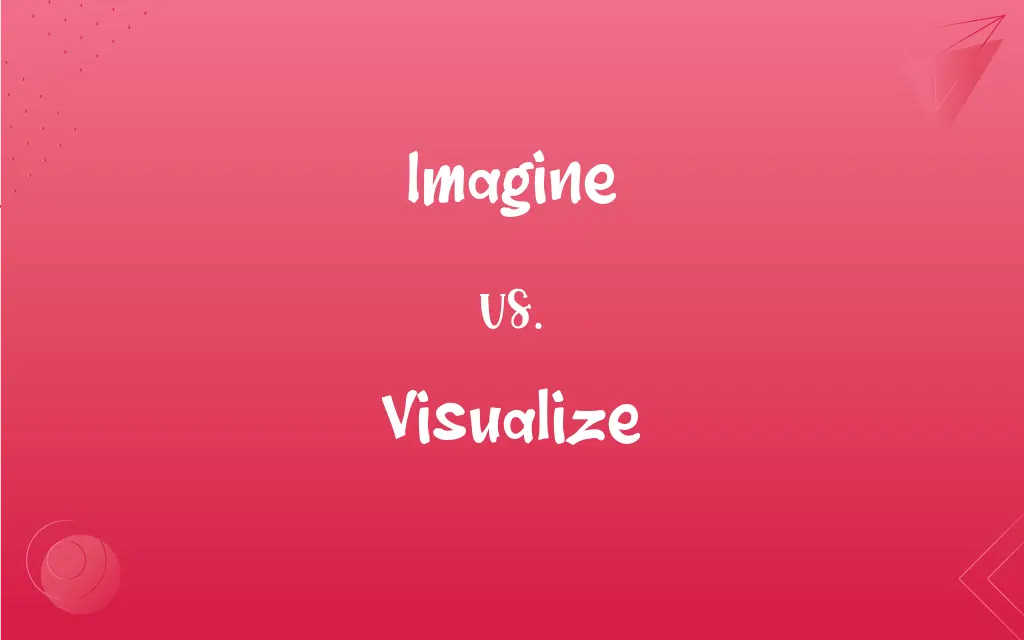Imagine vs. Visualize: What's the Difference?
Edited by Aimie Carlson || By Janet White || Published on December 16, 2023
To imagine is to create new ideas or concepts in the mind without sensory input, while to visualize is to form a mental image of something, often with more detail and based on real-life elements.

Key Differences
Imagine involves creating or thinking of something new or abstract without a concrete basis, focusing on creativity. Visualize, on the other hand, often involves mentally picturing something specific, relying on sensory or real-life details.
When we imagine, the details might be vague or fantastical. In contrast, visualizing typically involves clearer and more detailed mental images, often of real-world scenarios.
Imagination is used broadly for creative thinking, problem-solving, or artistic expression. Visualization is often used for specific goals like planning, recalling, or goal setting.
Imagination can involve complex cognitive processes, merging different ideas and scenarios. Visualization is more about focusing and refining the mental image of something specific.
Imagination plays a key role in arts, literature, and innovation. Visualization is crucial in fields like sports psychology, architecture, and therapy for mental rehearsal and planning.
ADVERTISEMENT
Comparison Chart
Focus
Abstract concepts, creativity, new ideas
Specific, detailed mental images
Detail and Clarity
Often vague, fantastical
Clear, detailed, and concrete
Purpose
Creative thinking, problem-solving
Planning, goal-setting, mental rehearsal
Cognitive Process
Complex, involving merging and altering concepts
Focused, refining a specific mental image
Application in Fields
Arts, literature, innovation
Sports psychology, architecture, therapeutic contexts
ADVERTISEMENT
Imagine and Visualize Definitions
Imagine
To think or suppose without evidence.
I imagine they'll arrive by noon, although I'm not sure.
Visualize
To form a mental image of something.
He visualizes his future home in great detail.
Imagine
To form a concept or idea not present to the senses.
I can imagine a world where peace prevails.
Visualize
To mentally picture a concept or scenario.
Athletes often visualize winning a race.
Imagine
To use the mind to create or simulate experiences.
He imagines himself as a hero in his daydreams.
Visualize
To use imagination to see something not physically present.
I visualize the garden in full bloom even in winter.
Imagine
To create mentally new and original ideas.
She imagines stories that captivate children's hearts.
Visualize
To make visible in one's mind, especially in detail.
She visualizes every step of her dance routine.
Imagine
To believe something possible or likely.
I imagine one day traveling to Mars.
Visualize
To imagine something as if seeing it.
Before painting, he visualizes the entire landscape.
Imagine
To form a mental picture or image of
Imagined a better life abroad.
Visualize
To form a mental image of; envisage
Tried to visualize the scene as it was described.
Imagine
To think or suppose; conjecture
I imagine you're right.
Visualize
To engage in psychological visualization with regard to (pain or a body process, for example).
FAQs
What does visualize mean?
To create a detailed mental picture of something.
Is imagining always creative?
Often, but it can also be practical or problem-solving.
Do you need to know how something looks to visualize it?
Generally, visualization is based on familiar or real-life elements.
How do athletes use visualization?
Athletes visualize to mentally rehearse and improve performance.
Is visualizing a form of imagination?
Yes, it's a specific way of using imagination focused on imagery.
How do artists use imagination?
Artists imagine to create original art, stories, or music.
Can imagining help in learning?
Yes, it can aid in understanding complex or abstract concepts.
What does it mean to imagine?
To conceive ideas or scenarios beyond current reality.
Do writers rely on imagination?
Absolutely, it's vital for creating stories and characters.
Can you imagine something you've never seen?
Yes, imagination can create entirely new concepts.
Is imagining always positive?
Not necessarily; it can also lead to unrealistic or negative scenarios.
Is visualization a skill that can be improved?
Yes, with practice, one can improve their ability to visualize.
Can visualization aid in stress reduction?
Yes, visualizing calming scenes can reduce stress and anxiety.
Can visualization help in goal setting?
Yes, visualizing goals can motivate and clarify steps to achieve them.
Can imagining be involuntary?
Yes, sometimes imagination occurs spontaneously.
Does visualization require concentration?
Generally, it requires focus to create clear mental images.
How does visualization aid in therapy?
It helps in creating positive mental states and coping mechanisms.
Does imagination play a role in innovation?
Yes, imagining new solutions is key to innovation.
Can everyone imagine and visualize?
Most people can, but the clarity and style can vary greatly.
Are imagination and visualization used in education?
Yes, they're tools for teaching and understanding complex ideas.
About Author
Written by
Janet WhiteJanet White has been an esteemed writer and blogger for Difference Wiki. Holding a Master's degree in Science and Medical Journalism from the prestigious Boston University, she has consistently demonstrated her expertise and passion for her field. When she's not immersed in her work, Janet relishes her time exercising, delving into a good book, and cherishing moments with friends and family.
Edited by
Aimie CarlsonAimie Carlson, holding a master's degree in English literature, is a fervent English language enthusiast. She lends her writing talents to Difference Wiki, a prominent website that specializes in comparisons, offering readers insightful analyses that both captivate and inform.






































































